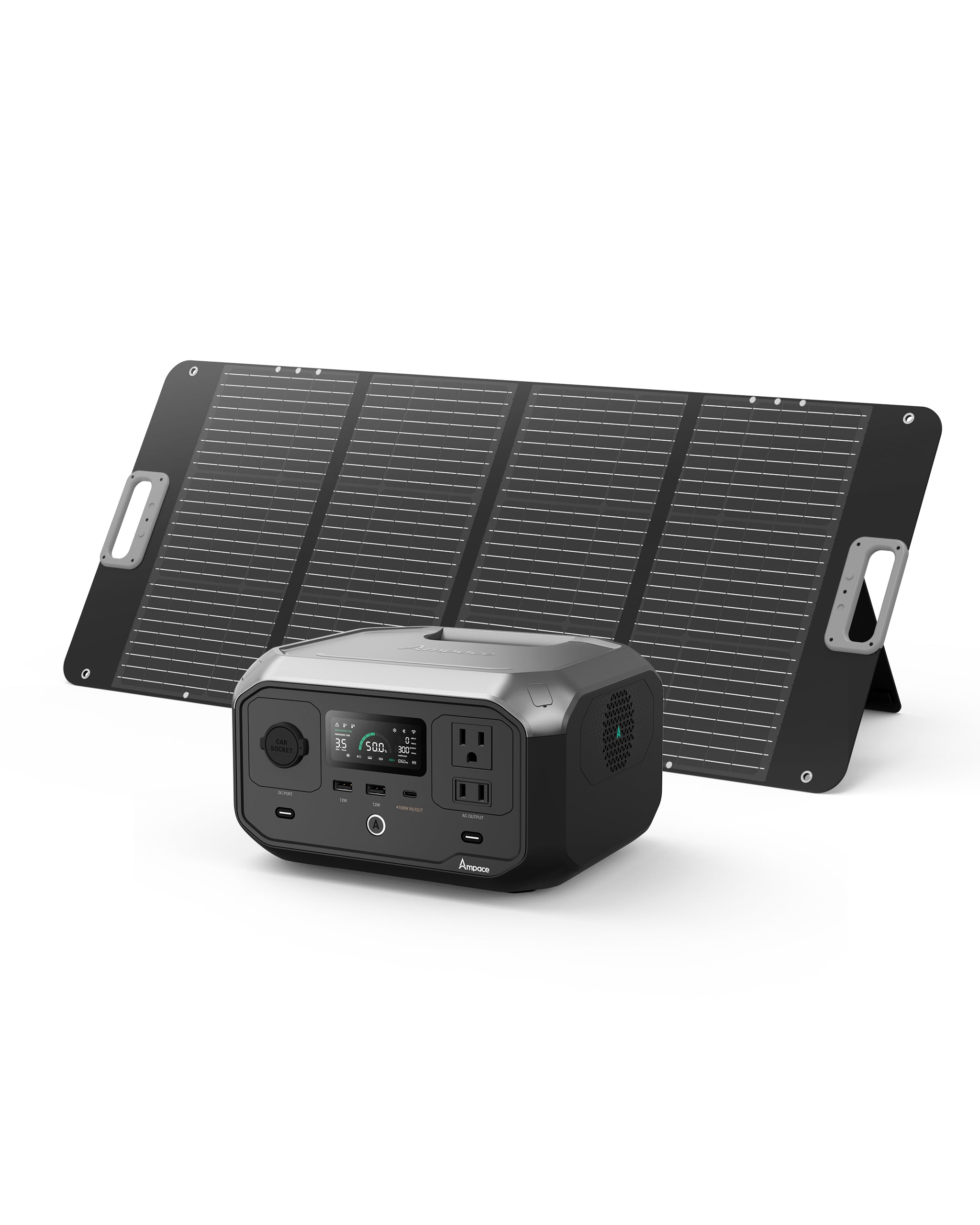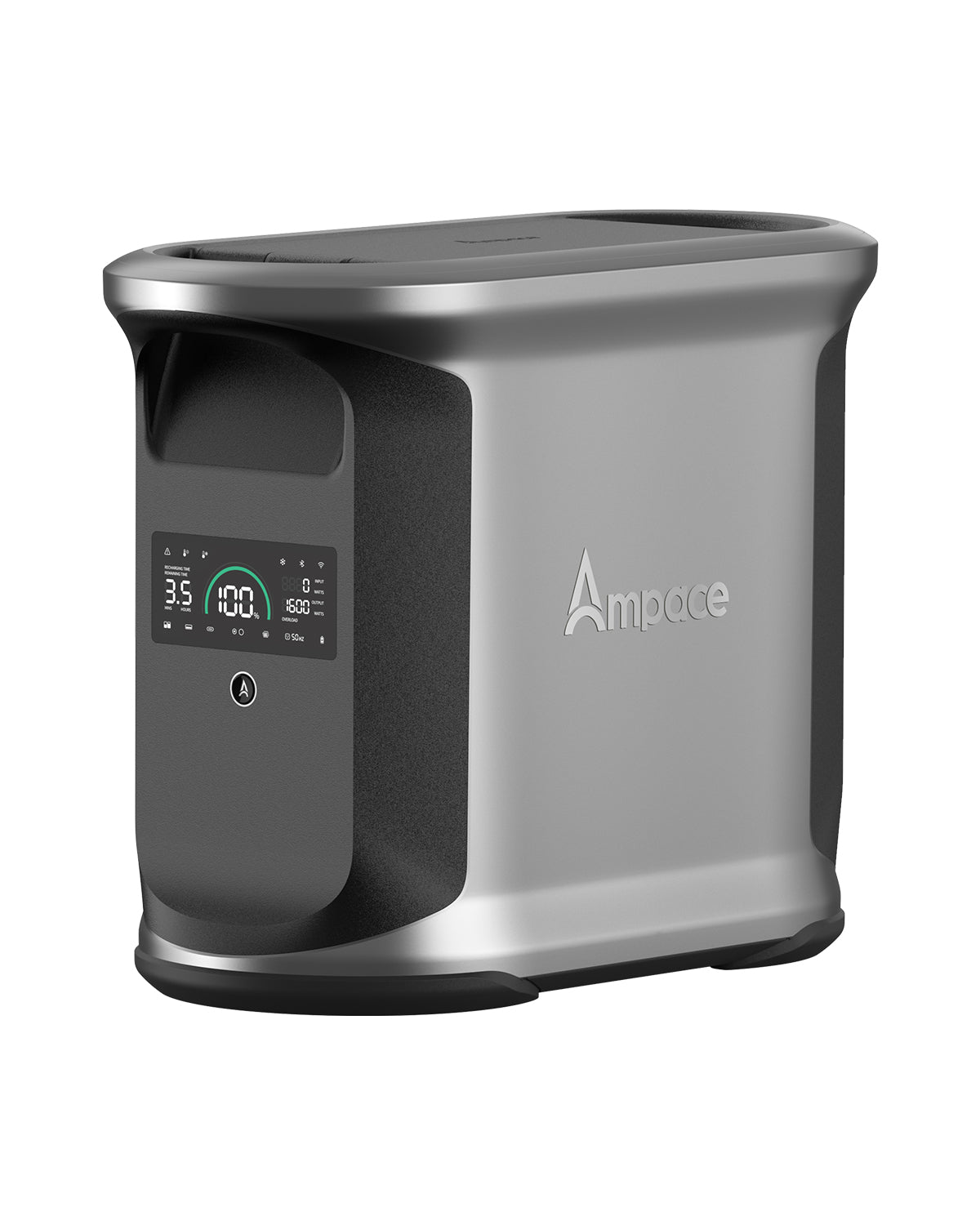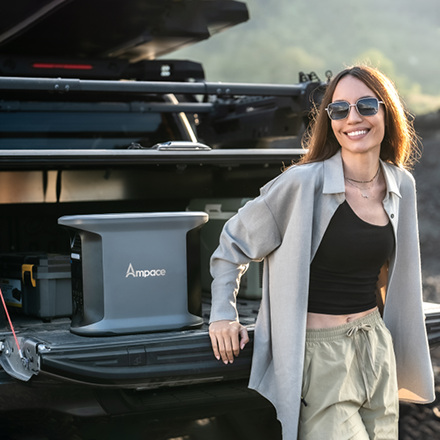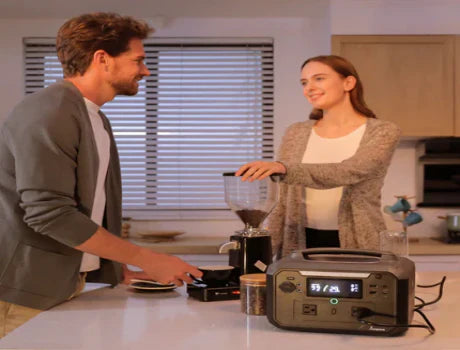Solar Generators with Panels vs Traditional Generators - Which Wins?
The choice of the right power source can be tricky. Should you pick a solar generator with panels or a traditional fuel-powered one? Both have their strengths and weaknesses. Solar generators use sunlight to provide clean, quiet energy, perfect for camping, RVs, or eco-friendly backup. Traditional generators run on fuel, offering strong power but with noise and fumes. So, Solar Generators with Panels vs Traditional Generators - Which Wins? This blog will discuss how each works, compare their pros and cons, and help you find the best fit for your needs.

What Are Solar Generators with Panels?
Solar generators with panels are special devices that make electricity from sunlight. They comprise three main parts: a battery, an inverter, and solar panels.
The solar panels collect energy from the sun. This energy is then sent to the battery, which is stored for later use. The inverter changes the stored energy from the battery into the kind of electricity that most of our home devices use.
These generators are very useful for many things. People use them for camping, in RVs, and as backup power at home during outages. They are also good for people who want to use clean and eco-friendly energy. Solar generators are quiet, easy to use, and do not produce harmful smoke.
What Are Traditional Generators?
Traditional generators are machines that make electricity using fuel. The most common types use gasoline, diesel, or propane.
These generators have an internal combustion engine. When you add fuel, the engine burns it to create energy. This energy is then turned into electricity that you can use.
People often use traditional generators at construction sites, for emergency backup during power cuts, and in remote locations without regular electricity. They are strong and can provide much power, but they make noise and release smoke.

Head-to-Head Comparison
When choosing between a solar generator and a traditional gas generator, it is important to look at the details. Here's a simple comparison of the most important factors.
Portability & Ease of Use
Solar Generators: These are designed for easy use. Most are "plug-and-play" systems. You just set the panels in the sun and turn on the power station. They are often lighter than gas models. This makes them great for camping or taking on a trip. There is no heavy engine or fuel tank to carry.
Traditional Generators: They are usually heavier and bulkier. You have to carry and store a separate fuel can. Starting one often requires pulling a cord. Because of the fumes, you must be careful with where you put it.
Power Output & Capacity
Solar Generators: Their power is measured in watt-hours (Wh) for capacity and watts (W) for output. They can run many devices. Small units can charge phones and laptops. Larger models can power a refrigerator or a TV for a few hours. However, they may be unable to run high-power tools or multiple large appliances simultaneously.
Traditional Generators: These are known for high power. They can run heavy-duty tools and multiple appliances at the same time. If you have enough fuel, they can provide a continuous power supply. This makes them a strong choice for construction sites or large events.
Fuel & Running Costs
Solar Generators: The initial cost is often higher. But after you buy it, the running cost is zero. The "fuel" is sunlight, which is free. This saves you money in the long run.
Traditional Generators: The initial purchase price is usually lower. However, you have to buy fuel every time you use it. The price of gas or diesel can change. Over time, these costs add up and can become very expensive.
Noise Levels
Solar Generators: These are very quiet. They have no moving engine parts. You might hear a very light hum from the internal fan, but it's not much louder than a silent computer. This is perfect for camping, use in a residential area, or for indoor backup power.
Traditional Generators: They are very loud. The sound of the engine can be annoying and can disturb neighbours. Their noise can be as loud as a vacuum cleaner or a lawnmower, making them unsuitable for quiet places.

Maintenance Needs
Solar Generators: These are very low-maintenance. There are no engines, oil, or spark plugs. You need to keep the solar panels clean from dust or dirt. The batteries inside are built to last for many years.
Traditional Generators: They require a lot of regular maintenance. You must change the oil, replace the air filters and spark plugs, and ensure the fuel is fresh. If you do not use them for a while, the old fuel can cause problems.
Environmental Impact
Solar Generators: They are clean and green. They produce electricity by capturing sunlight, with zero emissions. They do not release any harmful fumes or greenhouse gases. This makes them an excellent choice for the environment.
Traditional Generators: They burn fossil fuels. This creates carbon emissions, which are bad for the environment and cause air pollution. They also cannot be used indoors because of the dangerous fumes.
Cost
Upfront Costs: The initial cost of buying a solar generator is generally higher than that of a traditional one. This is because of the cost of the solar panels and the battery technology.
Long-Term Costs: With a solar generator, your long-term costs are very low. You do not pay for fuel. You only need to clean the panels. Traditional generators, on the other hand, have high long-term costs. You must keep buying fuel and paying for regular maintenance like oil changes and filter replacements.
Return on Investment: A traditional generator is cheaper at first. But a solar generator often pays for itself over time. The money you save on fuel and maintenance can eventually compensate for the higher initial price.
Situational Recommendations
-
Traditional generators are often better for long-term home power backup. They can run a house for a long time if they have fuel. However, for a short outage, a solar generator can work well to power key devices.
-
Solar generators are the best choice for these activities. They are quiet, light, and do not require you to carry fuel. You can enjoy the outdoors without the noise or smell of a gas engine.
-
Both can work for emergencies. Traditional generators give you high power right away. Solar generators are good because they do not rely on a fuel supply that might not be available.
-
A solar generator is the winner. It is the only option that uses a renewable energy source. It has a zero-carbon footprint and is perfect for clean living off the grid.

Why Ampace Solar Generators Stand Out in Off-Grid Power
Clean, Renewable Energy Source
Ampace solar generators use energy from the sun. They do not burn fuel or release pollution. You can charge them with solar panels while camping, in your RV, or anywhere off-grid. With up to 600W solar input and high-efficiency panels, you get more power from every ray of sunshine.
Quiet and Easy to Use
These generators make almost no noise. You can use them at night or in quiet places without disturbance. They are simple to set up. Just unfold the solar panel, plug it in, and start charging. All cables and instructions are included in the box.
Low Maintenance Compared to Fuel Generators
Ampace solar generators do not have engines or moving parts like fuel generators. This means there is no oil to change, no fuel to store, and fewer parts to break. Just keep the panels clean and the generator will last for years.
No Fuel Costs – Save Money Over Time
You never have to buy gasoline, diesel, or propane. Once you have your Ampace solar generator and panels, the sun does the rest for free. This saves you much money in the long run and makes off-grid living more affordable.
Safe for Indoor and Outdoor Use
Ampace solar generators are safe to use anywhere. They do not produce smoke or fumes, so you can use them inside your tent, RV, or home. The panels are lightweight, waterproof, and dustproof. They are easy to carry and work in all kinds of weather.
Built to Last
Ampace generators use advanced EV-grade LFP batteries. They can last over 10 years, even with daily use. The Andes 1500 can be recharged up to 6,000 times, twice as long as other brands. Each model comes with a long warranty and friendly customer support.
Perfect for Any Adventure
Whether camping, travelling, or needing backup at home, Ampace solar generators are ready. With fast charging, high power output, and many outlet types, you can power all your devices with peace of mind.
Pros & Cons
Solar Generators
Pros: Clean and eco-friendly, quiet, low maintenance, free fuel (sunlight), safe for indoor use, very portable.
Cons: Higher upfront cost, lower power output, relies on sunlight, may not run all heavy appliances.
Traditional Generators
Pros: Lower upfront cost, high power output, runs heavy appliances, provides continuous power with fuel.
Cons: Loud and noisy, high long-term costs (fuel/maintenance), high maintenance needs, not eco-friendly, unsafe for indoor use, heavy and bulky.
Conclusion: Which One Wins?
Choosing between a solar generator and a traditional generator depends on your specific needs and priorities.
-
A traditional generator is a strong option if you need high, continuous power for heavy-duty tasks or long-term outages, and a lower initial cost is a priority.
-
A solar generator is the better choice if you value a quiet, clean, portable power source with low long-term costs and an eco-friendly footprint.
Ultimately, both are effective tools for providing power in different situations. What works best for one person might not be right for another. We hope this comparison helps you make the right choice for you! Feel free to leave any comments or questions below.
FAQs
Can I use both a solar and a traditional generator together?
Yes, you can. Many people use both to combine the benefits of quiet, clean solar power with a traditional generator's high-power output and reliability when needed.
How long do solar generator batteries last?
Most solar generator batteries, especially modern lithium-ion ones, last 5 to 15 years. The lifespan is measured in "cycles," Factors like usage habits and operating temperature can affect how long they last.
Are traditional generators safe to use indoors?
No, never. Traditional generators produce carbon monoxide, a deadly gas. They must be operated outdoors in a well-ventilated area, far from any windows, doors, or vents, to prevent the fumes from entering your home.
What about hybrid options?
Hybrid generators combine a fuel-powered engine with a battery system. They are more efficient, quieter, and environmentally friendly than traditional generators because the engine only runs when necessary to charge the battery or meet high power demands.
















